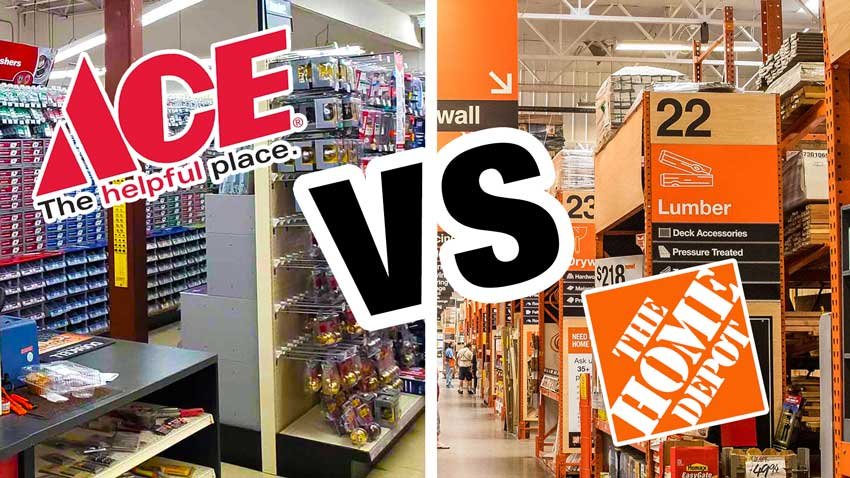
I can’t tell you how many times people have asked my opinion about shopping at Ace Hardware vs Home Depot. To understand my answer, you’d have to take into account a lot of information I’ve gathered over the years as well as how much I value small business. When you look at these two stores, it’s a sort of David vs Goliath showdown—but only in a certain sense of the analogy. Keep reading, and I’ll explain.
Ace Hardware vs Home Depot Company Size
When you look at Ace Hardware vs Home Depot in terms of company size you find some surprising things. For one, while The Home Depot (yes the company name actually includes “The” in front) has 2,200 stores, Ace Hardware actually has some 5,000 worldwide. So is Ace Hardware actually larger than Home Depot?
Not so fast.
Ace Hardware stores come in many sizes—each very different form the others. They also tend to be much smaller in size compared to the average Home Depot. Conversely, most Home Depot stores have a minimum amount of square footage (around 105,000 sq. ft.).
With Ace Hardware stores averaging around 30,000 square feet, that means it would take roughly 3X the number of Ace Hardware stores to match Home Depot’s numbers.
Do some quick math, and you see that Home Depot has somewhere in the neighborhood of 231 million square feet of retail space while Ace Hardware has around 150 million.
Most Retail Space: The Home Depot
Ace Hardware: The Helpful Place
Ace Hardware bills itself as “the helpful hardware place.” As such, they focus more on repair and maintenance rather than renovation. Conversely, Home Depot and Lowe’s include large lumber, roofing, trim, and siding supply areas where customers can load up pallets worth of materials.
Want to get help and advice with your plumbing project? You might luck out and get someone at Home Depot who knows what they’re talking about. More than likely, however, you’ll find someone who can merely point you in the right direction.
If you need to get more detailed help, I’ve found that Ace Hardware tends to have much more skilled employees on staff. It may be the structure of how they run their business, or it may be the smaller store size. In either case, I’ve tended—in my town at least—to get better advice from Ace Hardware stores. That may be worth spending a little extra.
Best Customer Service: Ace Hardware
Ace Hardware vs Home Depot Corporate Structure
A key difference when looking at Ace Hardware vs Home Depot includes the fact that Ace Hardware uses franchises. Compare that to The Home Depot where each store is corporate-owned. This gives Ace the ability to be more responsive to a community’s needs than their big-box ‘one-business-model-fits-all’ rivals.
In our town, that means Ace Hardware can carry the replacement parts more likely to be needed in a 1920’s bungalow home or a Florida 1950’s block house. When people come in repeatedly looking for a particular part, you can bet Ace will locate it and get them in so future customers don’t need to special order them. I’ve personally seen this with parts for toilets, antique locks and hinges, air conditioner parts, ballasts, and more.
Ace is opening 6 more stores in the next 6 months with 8 total to be opened in the next 2 years. This would give Ace a total of 54 stores just in the metro-Atlanta area. This rapid growth in Home Depot’s backyard is attributed to the high availability of retail space and the economy.
Another huge differentiator between Home Depot and Ace Hardware comes down to the tool brands represented. With less retail space, Ace cannot carry nearly the amount of brands as Home Depot. That leads to picking strategic partners. As far as we can tell in our area, here are the key power tool brands present in each physical store:
Ace Hardware Tool Brands
- Black and Decker
- Craftsman
- DeWalt
- Milwaukee Tool
- EGO Power+
- Steel Grip
- Stanley
Home Depot Tool Brands
- Black + Decker
- Bosch
- Cub Cadet
- DeWalt
- Echo
- Homelite
- John Deere
- Makita
- Milwaukee Tool
- Ridgid Power Tools
- Ryobi
- Toro
- Troy-Bilt
We feel the need to mention, however, that both Home Depot and Ace Hardware allow free “ship-to-store” options which greatly expand the number of brands and products available at each. Still, the ability to walk in and get what you want immediately makes a big difference when comparing Ace Hardware vs Home Depot.
Most Brands: The Home Depot
Home Renovation vs Home Preservation
Home Depot tends to focus on home renovation. Ace leans more towards home preservation. When the economy slows, people’s wallets tend to get tighter. Rather than gutting and redoing a bathroom, they look to fix or enhance. The fact that the stores are franchised rather than corporate plays to these strengths as well. While Home Depot (and Lowe’s for that matter) follow a regional strategy, each Ace franchisee can tailor their store to the particular flavor of their community. If people in the community are interested primarily in outdoor activities and projects, they can stock more of those. If it is a coastal or mountainous region, their inventory can reflect that.
Starting a franchise is no small matter, however, with a required net worth of $400,000 and $250,000 in cash. Startup fees can reach a cool million dollars. Each store can carry upwards of 20,000 products.
Best for Local Needs and Supplies: Ace Hardware
Lumber and Building Materials
If you want or need lumber or building materials, you really end up going to The Home Depot. While Ace certainly has PVC piping, fixtures, and a selection of materials, The Home Depot crushes them on volume and options. In many instances, you simply cannot get either the materials or the quantities you might need at an Ace Hardware store. They don’t have the space to handle that kind of volume.
As such, The Home Depot remains the choice for Pros when they need something on-the-fly to complete a job, while Ace Hardware remains a great pace for picking up those smaller pieces you need for landscaping, painting a room, a doing a plumbing or electrical repair.
Building Supplies and Materials: The Home Depot
Wrapping Up the Home Depot vs Ace Hardware Debate
In our experience, the local Ace Hardware has always been a truly helpful store, but that’s about where the praises end. Home Depot and Lowes have consistently shown lower prices for most products—from tools to electrical and plumbing supplies. It will be interesting to see if Ace can continue to compete in this market. We also want to see if they continue to expand—and which store thrives more during the (inevitable) next downturn. Competition is typically good for the consumer, so we’ll look forward to seeing the results throughout the coming year.






